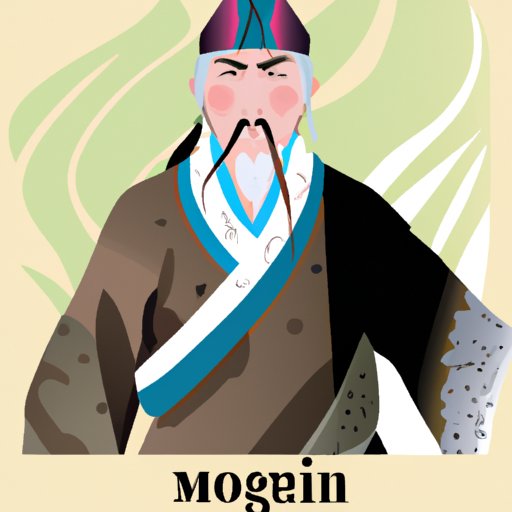Introduction
Genghis Khan is one of the most famous leaders in history. He was the founder and first Great Khan of the Mongol Empire, which he ruled from 1206 until his death in 1227. His rule marked the creation of the largest contiguous land empire in history, stretching from Eastern Europe to the Sea of Japan. But what made him such a great leader? In this article, we will explore how Genghis Khan was a good leader by looking at his military leadership, political strategies, legacy, economic impact, and religious tolerance.
Analyzing Genghis Khan’s Military Leadership
Genghis Khan was an incredibly successful military leader. He had a unique strategic approach that enabled him to outsmart and outmaneuver his enemies. According to historian David Morgan, “he was able to combine the traditional Mongolian tactics of hit-and-run with more sophisticated siege techniques to devastating effect.”
In addition to his strategic approach, Genghis Khan also used innovative tactics to gain the upper hand in battle. For example, he often employed psychological warfare, such as sending messages of terror and destruction to enemy camps before attacking. He also made use of advanced technology, such as catapults and trebuchets, to break through fortified walls.
Finally, Genghis Khan was known for leading from the front. He was often seen on the battlefield, inspiring his troops with his courage and determination. This gave his soldiers confidence and helped them perform better in battle.
Exploring Genghis Khan’s Political Strategies
As a political leader, Genghis Khan was highly effective. He was able to unify the Mongol tribes, which had been divided and warring against each other for centuries. He accomplished this by using a combination of diplomacy and military force. He created an alliance between the tribes and forged a unified Mongol nation.
Genghis Khan also had an expansive vision for the future of the Mongol Empire. He wanted to expand the empire beyond its current borders and create a powerful and prosperous state. To do this, he engaged in diplomatic negotiations with neighboring countries, often offering them protection in exchange for tribute and loyalty.
In addition, Genghis Khan showed a remarkable level of tolerance towards people of other faiths. He welcomed foreign traders and ambassadors from different religions, allowing them to practice their own beliefs without persecution.
Examining Genghis Khan’s Legacy
Genghis Khan left an indelible mark on history. His conquests changed the course of world history, ushering in a period of unprecedented growth and prosperity for the Mongol Empire. He also made significant contributions to warfare, pioneering new tactics and introducing new technologies that are still used today.
His influence can also be seen in the political landscape of Central Asia. He established a new system of government based on meritocracy and religious tolerance, which allowed the Mongol Empire to thrive for centuries. This system of government eventually spread to other parts of the world, including China and Russia, where it still has an impact today.
Investigating Genghis Khan’s Economic Impact
Genghis Khan was also a great economic leader. He established trade routes that connected the Mongol Empire with the rest of the world, allowing goods and ideas to flow freely across the region. This helped promote commerce and encouraged the development of a vibrant economy.
He also encouraged craftsmen and artisans to settle in the Mongol Empire, creating a thriving cultural scene. He even went so far as to offer tax incentives and other benefits to those who chose to move to the region. This helped create a vibrant and prosperous society.
Evaluating Genghis Khan’s Religious Tolerance
Genghis Khan was well known for his respect for different beliefs. He allowed people of all religions to practice their faith without fear of persecution. He also welcomed foreign traders and ambassadors from different cultures, something that was unheard of at the time.
This open-mindedness towards different faiths was a major factor in the success of the Mongol Empire. It allowed the Empire to become a melting pot of different cultures and beliefs, which helped create a cohesive and prosperous society.
Conclusion
Genghis Khan was a great leader who changed the course of history. He was a skilled military commander who employed innovative tactics and led from the front. He was a political strategist who unified the Mongol tribes and had an expansive vision for the future. He was an economic innovator who promoted trade and encouraged craftsmanship. And he was a religious tolerant who respected different beliefs. All these qualities combined make him one of the greatest leaders in history.
In conclusion, Genghis Khan was a good leader because of his strategic approach, innovative tactics, unification of tribes, expansionist vision, diplomatic approach, and respect for different beliefs. His legacy lives on today and continues to shape the world around us.
(Note: Is this article not meeting your expectations? Do you have knowledge or insights to share? Unlock new opportunities and expand your reach by joining our authors team. Click Registration to join us and share your expertise with our readers.)
